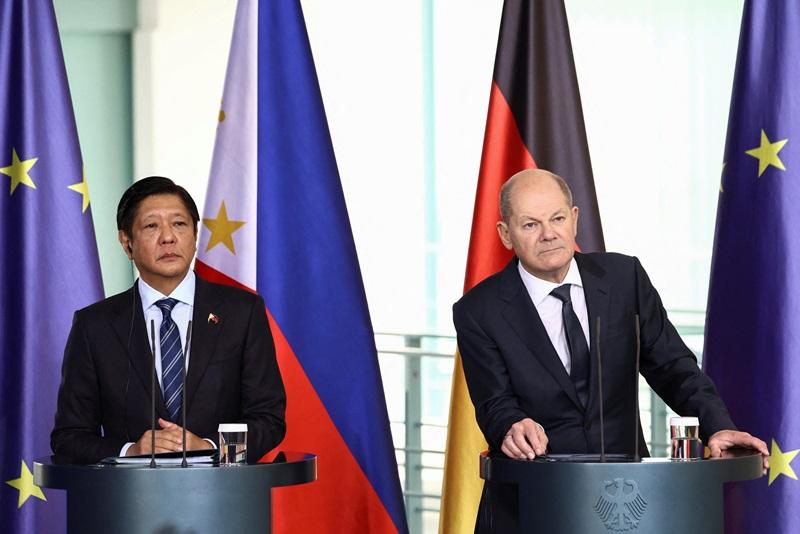 World Leaders Surprised by What Germany Said About the Philippines!
World Leaders Surprised by What Germany Said About the Philippines!
In an unexpected statement from Berlin, Germany, a high-ranking German government official made a bold comment about the Philippines — a comment that immediately sparked heated discussion around the world. Within hours of its release, it went viral on social media and became a trending topic in various countries.
According to a report by Deutsche Rundschau , at an international economic forum held in Hamburg, Dr. Heinrich Muller , Germany’s Minister of Economics, uttered the following words:
“If there is a country born to succeed in Asia, it is the Philippines.”
This simple statement, he said, is a result of the country’s continued economic growth, the resiliency of Filipinos, and the country’s unique potential in technology and energy. But for some, this is not a simple compliment — it is a warning or sign of an upcoming geopolitical shift.

The Reaction of World Leaders
Leaders from various countries responded quickly. In America, a White House spokesman said that “any statement that would position the Philippines as a new ‘strategic hub’ in Asia should be carefully considered.”
Meanwhile, in Japan, Prime Minister Nakahara issued a more cautious statement, saying:
“The Philippines has always been an important partner in the region. But if what Germany is saying is true, this is a new phase in the global dynamics.”
On the other hand, China issued an unexpected reaction. Instead of praising, their spokesperson said:
“Such statements may create a false impression of the region. Asia is not a competitive arena for Westerners.”
Such words have added further tension to the deteriorating situation in the South China Sea.
What Does Germany Mean?
According to analysts, Dr. Muller’s statement is not a coincidence. In the past two years, Germany has shown great interest in the Philippines’ renewable energy and semiconductor industries. There are reports that more than 20 German companies are planning to invest in the country before the end of the year.
Some of them are from Siemens , Bosch , and even some companies that were previously based in China.
They are said to be looking for a more “stable and friendly environment” — and they see it in the Philippines.
But according to political analyst Prof. Ramon Ilustre from UP, there is a deeper reason:
“This is not just about economics. Germany may be using the Philippines as a symbol of the changing balance of power in Asia. Their message is clear: a new star is rising in the region.”
The Reaction of Filipinos
While the world was shocked, Filipinos felt a different emotion.
Many were happy and proud on social media. The hashtags #GermanyLovesPH and #ProudPinoy were trending .
But some were also skeptical, saying that it might be just a political strategy to gain the country’s trust in the midst of the superpower conflict.
In an interview with an OFW in Berlin, he said:
“It makes me proud to hear that this is how foreigners view the Philippines. But I hope it’s not just words. I hope there are actions.”
Statement From Malacañang
Malacañang was also quick to respond.
In a press conference, Presidential Spokesperson Atty. Diwa Rosales said:
“The Philippines welcomes any recognition of the capabilities of our people. What Germany said is proof that we continue to rise.”
But on the other hand, some senators have called for a more cautious reception.
According to Sen. Leandro Villena:
“We must find out what this praise is worth. In diplomacy, nothing is free. Everything has a reason.”
Germany’s Plans for the Philippines
Documents released by the Bundeswirtschaftsministerium (German Ministry of Economy) reveal that Germany plans to open a Philippine-German Energy Innovation Center in Cebu before the end of next year.
The goal is to strengthen cooperation in the fields of green energy, hydrogen fuel, and digital transformation.
This project is expected to create more than 50,000 jobs within five years and bring in billions of dollars in investment.
This is why Dr. Muller said his historic line — a statement that set the world on fire.
Conclusion
If all of this is true, it seems the Philippines is once again in the spotlight — not because of controversy or tragedy, but because of its rise and potential .
As world leaders watch, it seems the country’s image on the global stage is slowly changing.
From a country once considered “developing,” it is now being talked about as the next center of change in Asia.
And if what Germany says is true, perhaps it is time for Filipinos to believe that the future is not just a dream — but a possibility.


